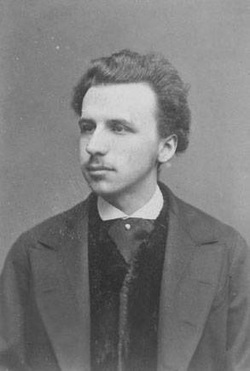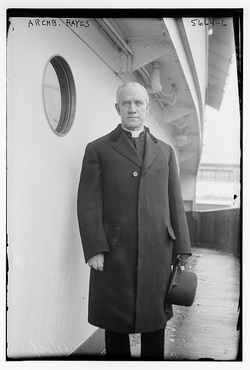Margaret Sanger; Voyage Through Debate and Diplomacy
Birth control became more than just an issue of advancing women rights, but many people began to question the morality of using birth control.
John Russell Debate, 1920

John Russell saw the cruciality in America's overpopulation problem. He recognized the economic stress that children added. Russell agreed that the only way to stop this problem was to stop producing, but his opinion on halting child birth differed. “Sex control is the best path to self-control and to self-discipline. It is the key to wisdom. It is the key to power. It is the key to intellectual and mental development.” Russell believed that sex should only take place in marriages, if at all. He considered sex as a foolish indulgence, and not a necessity that confirms a marriage. By indulging in these sex people had to face the repercussion of children. If couples had chosen abortion or birth control during/after their sex they were being dishonorable and irresponsible by not serving the proper consequence. “That means you can't get pleasure without paying for it. Nature is inexorable in bringing about her retribution… You can't cheat. You can't get away from it. You must pay at last for your own debt. Those are the laws…Birth control says "yes." You shall pay the price. You can annihilate that energy and drink from the cup of pleasure, but you don't take the responsibility-the duty and the care."
Margaret Sanger opened her speech saying that Russell didn't carry an intelligent argument. The crowd reacted in agreeable laughter. “We have a few principles of life by which we must live, and I claim that everyone of us has a right to health, to liberty and to the pursuit of happiness. I say furthermore that birth control is an absolutely essential factor in our living and having those three principles of happiness.” Sanger informed the public that she doesn't want to restrain them from happiness even if that includes sexual activity. Russell had only advised avoiding it.
Unlike Russell's belief that using contraceptions makes you irresponsible, Sanger believed that the exact opposite. “Very few people think at the time of creation that they are going to create. Most of us are brought into the world by accident and that is exactly what birth control is going to change. That is going to make humanity a conscious and voluntary thing.” Providing many valid points Sanger had defeated her first opponent and gained many supporters. To close of the argument she ridiculed her opponent, “He tells us that we cannot have pleasure without pain. It is a man who is speaking.”
Margaret Sanger opened her speech saying that Russell didn't carry an intelligent argument. The crowd reacted in agreeable laughter. “We have a few principles of life by which we must live, and I claim that everyone of us has a right to health, to liberty and to the pursuit of happiness. I say furthermore that birth control is an absolutely essential factor in our living and having those three principles of happiness.” Sanger informed the public that she doesn't want to restrain them from happiness even if that includes sexual activity. Russell had only advised avoiding it.
Unlike Russell's belief that using contraceptions makes you irresponsible, Sanger believed that the exact opposite. “Very few people think at the time of creation that they are going to create. Most of us are brought into the world by accident and that is exactly what birth control is going to change. That is going to make humanity a conscious and voluntary thing.” Providing many valid points Sanger had defeated her first opponent and gained many supporters. To close of the argument she ridiculed her opponent, “He tells us that we cannot have pleasure without pain. It is a man who is speaking.”
Archbishop Hayes Debate, 1921

Archbishop Hayes was a prestigious preacher having famous sermons. On December 31st Hayes delivered his pastoral letter in the Archdiocese of New York in front of 300 masses. This sermon became more than Jesus Christ's birth, but was turned into Hayes' moral standpoint. During his sermon he describes birth control as an "evil spirit" and an act of satan. "Heinous is the sin committed against the creative act of God, who through the marriage contract invites man and woman to co-operate with him in the propagation of the human family. To take life after its inception is a horrible crime: but to prevent human life that the Creator is about to bring into being is satanic. In the first instance, the body is killed, while the soul lives on: in the latter, not only a body but an immortal soul is denied existence in time and in eternity. It has been reserved to our day to see advocated shamelessly the legalizing of such a diabolical thing."
After Sanger heard of Hayes' religious and moral lash out Sanger held a conference in response. Hayes was focusing on his religion rather than benefiting humanity, “What he believes concerning the soul after life is based upon theory, and he has a perfect right to that belief; but we who are trying to better humanity fundamentally believe that a healthy, happy human race is more than keeping with the laws of God than disease, misery and poverty perpetuating themselves generation after generation.” She saw her response to Hayes' sermon as completely acceptable considering that he was enforcing his religion and moral standpoints upon Protestant members and the rest of the country.
After Sanger heard of Hayes' religious and moral lash out Sanger held a conference in response. Hayes was focusing on his religion rather than benefiting humanity, “What he believes concerning the soul after life is based upon theory, and he has a perfect right to that belief; but we who are trying to better humanity fundamentally believe that a healthy, happy human race is more than keeping with the laws of God than disease, misery and poverty perpetuating themselves generation after generation.” She saw her response to Hayes' sermon as completely acceptable considering that he was enforcing his religion and moral standpoints upon Protestant members and the rest of the country.
